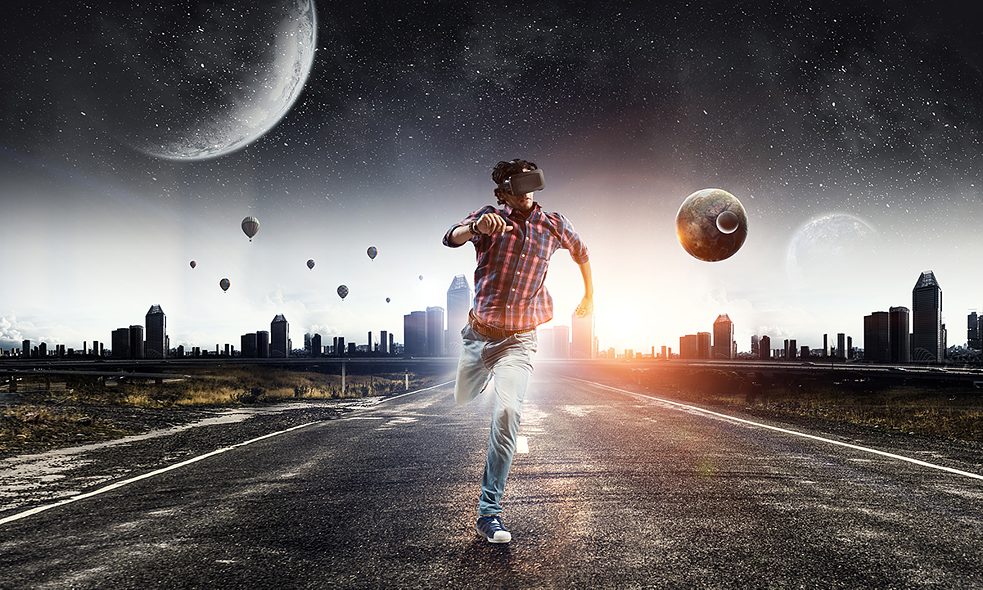What constitutes reality?
Realer than real

How can and should reality be defined in these days of virtual and alternative realities, of VR goggles and fake news?
By Thilo Hagendorff
What is there? What truly exists? What is real? At first glance, these questions seem like they would be easy to answer, since surely reality is what we can touch and feel. But a closer look reveals it is much more complicated. Is what we perceive always reality, or just a subjective phenomenon we experience?
General societal agreement
A widespread understanding of what constitutes reality is based on the assumption that there is a material reality that can be perceived through the senses and depicted using language and the imagination. This is what we generally refer to when we talk about reality in everyday life. Reality is what we can observe and measure, what can be expressed by factually verifiable knowledge, that which exists as an objective outside world and is never arbitrary. Philosophical theories such as scepticism have questioned the existence of a material world, arguing one could be engaged in an ongoing dream that something like reality exists. Beyond such mind games, however, the common understanding is that a real world exists, and that there is true knowledge and true sentences in essential agreement with this world.
As a society then, we seem to share a general understanding of what might constitute reality in everyday life. This in no way means we have already arrived at a satisfactory definition of reality, though. In recent years, two phenomena have raised issues that push our everyday understanding of what is real to the limit. First, there is virtual reality. Technological developments have made it possible to simulate digital realities that feel as real as the non-virtual world. Second is the completely different and socially highly charged development of fake news, disseminated stories based on fiction that create new realities through the media.
Both phenomena demonstrate that there is no single objective reality. Instead, there appear to be innumerable virtual realties or fictitious realities distorted by the media and these may be viewed as true or existent in fact. So what do both phenomena tell us about reality, and how should we classify virtual or fictitious realities?
Realer than real: virtual reality
Philosophers have explored the implications of virtual reality (VR) and the technology behind since its inception. The central question is what it actually means if reality is virtual, given that the adjective virtual is generally used to describe something artificial or not real. This virtual reality only has the status of a supplementary representation of reality. What is virtual is supposedly not real, but a simulation or a model of reality.
 Virtual reality is increasingly coming to resemble natural reality on a sensory and visual level - and can thus be experienced as real.
| Photo: © Adobe
Constant improvement in VR hardware, especially in data glasses, has also raised the idea that virtual and non-virtual reality could one day become indistinguishable. This would mean that virtual reality would no longer be perceived as a kind of oppositional, second reality. The clear division between virtual and non-virtual reality would disappear, and it would make more sense to distinguish between different modes of reality. This roughly corresponds to the tenets of epistemology and cognitive science which conceive of reality as a construct that can neither be objectively perceived nor expressed by factual claims. In short: reality is what the individual makes of it. This in turn means that there is no longer only one idea of reality, but many.
Virtual reality is increasingly coming to resemble natural reality on a sensory and visual level - and can thus be experienced as real.
| Photo: © Adobe
Constant improvement in VR hardware, especially in data glasses, has also raised the idea that virtual and non-virtual reality could one day become indistinguishable. This would mean that virtual reality would no longer be perceived as a kind of oppositional, second reality. The clear division between virtual and non-virtual reality would disappear, and it would make more sense to distinguish between different modes of reality. This roughly corresponds to the tenets of epistemology and cognitive science which conceive of reality as a construct that can neither be objectively perceived nor expressed by factual claims. In short: reality is what the individual makes of it. This in turn means that there is no longer only one idea of reality, but many.
The idea of the indistinguishability between non-virtual and virtual reality is still a mere thought experiment and technically realizing it is purely speculative. One of the best-known researchers in the field of virtual reality, Jeremy Bailenson, nevertheless assumes that it will hardly be possible to visually differentiate between virtual and non-virtual reality in ten to twenty years. VR researcher Michael Heim also speaks of the “paradox of virtuality” which states that the expression “virtual reality” makes less and less sense on a sensory level the closer it gets to approximating natural reality.
Still VR technologies have not yet triggered a serious debate about whether what we call real is arbitrary, unlike our second phenomenon: fake news.
Making up reality: fake news
In these times of fake news, alternative facts, conspiracy theories and other distorted media content, the idea of the plurality or even relativity of different references to reality assumes a rather problematic role. If there is no shared, basic understanding of reality, processes of democratic negotiation become dysfunctional.
 The Internet gives us access to more information than ever before, information that describes very different worlds. Although fake news is based on fiction, it is creating new realities in the media.
| Photo: © Adobe
At this juncture, it is interesting to note that the humanities, and media ethics in particular, have long advocated the thesis that progressive societies need precisely such a plurality of constructions and concepts of reality. As media scholar Bernhard Pörksen wrote in 2014, democracies depend on alternative and competing concepts of reality that should not be made absolute. He proposed that dogmatic views of reality should be rejected accordingly.
The Internet gives us access to more information than ever before, information that describes very different worlds. Although fake news is based on fiction, it is creating new realities in the media.
| Photo: © Adobe
At this juncture, it is interesting to note that the humanities, and media ethics in particular, have long advocated the thesis that progressive societies need precisely such a plurality of constructions and concepts of reality. As media scholar Bernhard Pörksen wrote in 2014, democracies depend on alternative and competing concepts of reality that should not be made absolute. He proposed that dogmatic views of reality should be rejected accordingly.
Nowadays, the media have realised this demand to increase the plurality of concepts of reality - and the consequences of this relativism are destroying progress made by democratically constituted states worldwide. Distorted, false or ideologically slanted news spread via messengers, groups, automated bots and personalised algorithms and are accessed and read millions of times.
In the discourse around fake news, the old philosophical idea of an actual, true reality that we only need to recognize in order to separate fact from fiction is regaining relevance. The very term “fake news” is indicative of a perspective that assumes facts can be objectively recognised.
Democracy requires more basic, shared truths
Admittedly, a dogmatic and authoritarian determination of what is reality must be regarded as problematic. On the other hand, a relativism of reality results in random and unproductive conflicts. If we are to be able to continue to protect democracies, it is essential to regain a certain level of basic, shared truths that can be the starting point for debate. Appropriate middle ground needs to be created through new media literacy education, adopting certain journalistic ideals for generating content on the Social Web, more respect for scientific findings, and modified algorithms.
 Democracies are founded on debate. Without a basic social agreement on truth and fiction, democratic negotiation processes become dysfunctional.
| Photo: © Adobe
As is so often the case, the answer is not black and white. Unlike in the film Matrix, people do not unknowingly live in different virtual reality simulations, nor can they unequivocally access an objective reality via language or observation. We need to take a more pragmatic approach by recognising two fundamental facts. The first is that reality is socially constructed. The second is that what is truth and what is fiction can never be entirely arbitrary. Unlike relativist theories might suggest, healthy societies require a certain stock of collectively shared conceptions of what is real.
Democracies are founded on debate. Without a basic social agreement on truth and fiction, democratic negotiation processes become dysfunctional.
| Photo: © Adobe
As is so often the case, the answer is not black and white. Unlike in the film Matrix, people do not unknowingly live in different virtual reality simulations, nor can they unequivocally access an objective reality via language or observation. We need to take a more pragmatic approach by recognising two fundamental facts. The first is that reality is socially constructed. The second is that what is truth and what is fiction can never be entirely arbitrary. Unlike relativist theories might suggest, healthy societies require a certain stock of collectively shared conceptions of what is real.